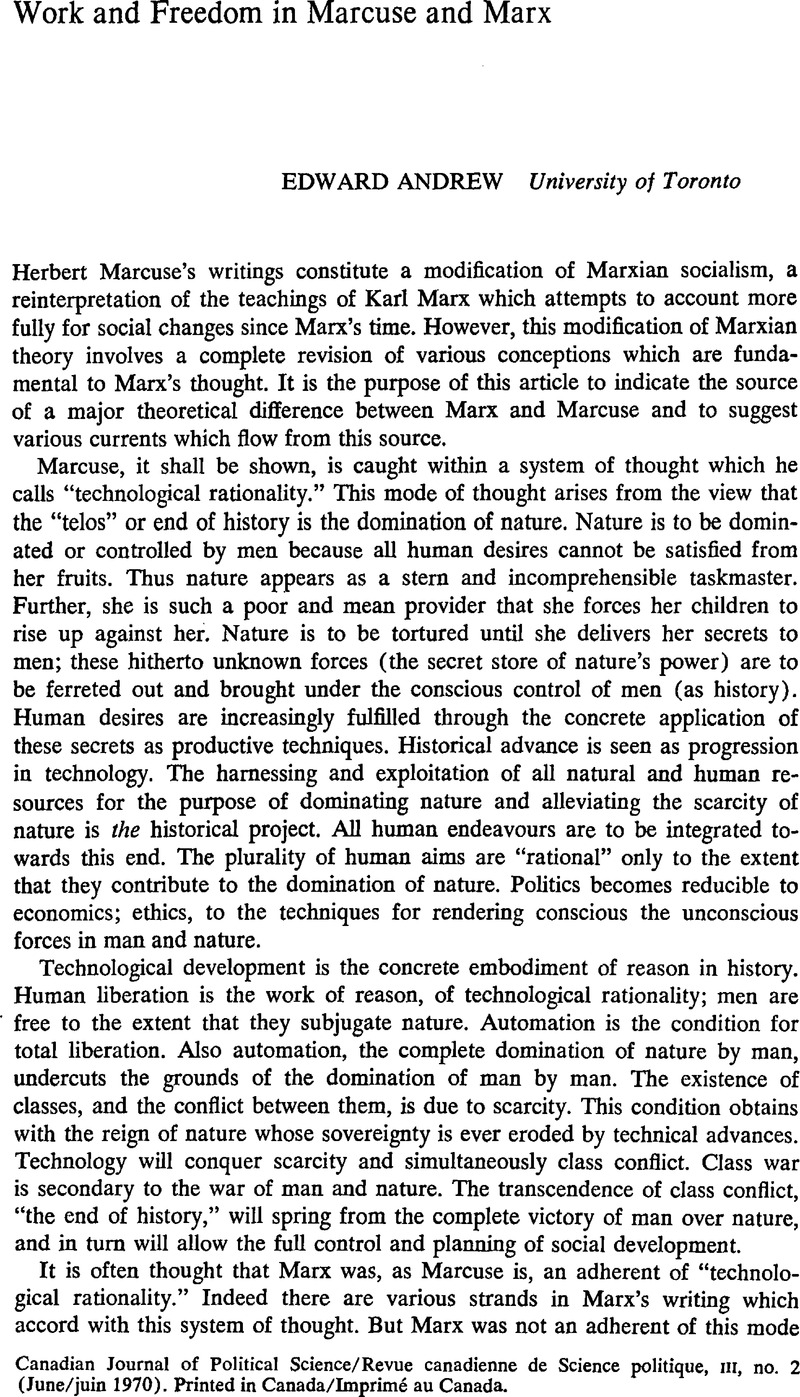Published online by Cambridge University Press: 10 November 2009

1 See The German Ideology (London, 1965), 31–2.
2 Economic and Philosophic Manuscripts (Moscow, 1961), 75.
3 Ibid., 79.
4 Ibid., 105–6.
5 An Essay on Liberation (Boston, 1969), 20–1.
6 Capital (Moscow, 1962), iii, 800.
7 Grundrisse der Kritik der Politichen Oekonomie (Berlin, 1953), 505.
8 See prefaces to Eros and Civilization (Boston, 1961) and Negations (Boston, 1968); One-Dimensional Man (Boston, 1966), 16, 36–7.
9 Capital, iii, 799.
10 Critique of the Gotha Programme (Moscow, 1959), 36.
11 The Manifesto of the Communist Party (Moscow, n.d.), 81; Capital, i, 484, 488.
12 Grundrisse, 593.
13 Engels, F., Anti-Duehring (Moscow, 1954), 252.Google Scholar
14 Eros and Civilization, 142; cf. An Essay on Liberation, 20–1; One-Dimensional Man, 16, 37; Negations, 258.
15 Eros and Civilization, 178.
16 Ibid., 199; One-Dimensional Man, 44, 251–2.
17 Critique of the Gotha Programme, 22.
18 Eros and Civilization, 204.
19 Ibid., 199–201. Marcuse cites Armand, F. and Maublanc, R., Fourier: textes choisis (Paris, 1937), ii, 240Google Scholar ff.
20 Grundrisse, 505; cf. p. 599.
21 An Essay on Liberation, 21–2.
22 Eros and Civilization, chaps. 8–10.
23 Grundrisse, 412.
24 An Essay on Liberation, 88.
25 One-Dimensional Man, chap. 9.
26 Ibid., 231.
27 Ibid., 252.
28 “The Obsolescence of Marxism,” in Lobkowicz, N., ed., Marx and the Western World (Notre Dame, 1967), 415.Google Scholar
29 From Beer, M., A History of British Socialism (London, 1929), ii, 219.Google Scholar
30 Ibid. A more complete discussion may be found in Lozovsky, A., Marx and the Trade Unions (New York, 1942Google Scholar).
31 One-Dimensional Man, 44.; cf. Eros and Civilization, 205.
32 Marcuse states that “the repressive bureaucracy” in socialist countries is only perpetuated because of the threat that capitalist countries pose to them. One-Dimensional Man, 42; preface to An Essay on Liberation. Weber's reflections on bureaucracy and Marx's thoughts on Oriental despotism are apposite here.
33 “The Obsolescence of Marxism,” 417.
34 An Essay on Liberation, 62.
35 Ibid., 53.
36 One-Dimensional Man, 40–1.
37 An Essay on Liberation, 70.
38 Werke (Berlin, 1956), IV, 338–9.
39 Ibid., viii, 598–9.
40 A Critique of Pure Tolerance (Boston, 1965), 108.
41 One-Dimensional Man, 251–2. Needless to say, those arch-exponents of “technological rationality,” the Bolsheviks, justified the replacement of union and soviet control of industry by the party hierarchy in terms of the needs of rapid technological development.
42 Ibid., 231, 237.
43 Ibid., 251.
44 The Civil War in France (Moscow, n.d.), 65.
45 It is perhaps to be noted that Trotsky, justified “the militarization of labour” because of men's natural aversion to work. See A Defence of Terrorism (London, 1921), 122–3, 131–4.Google Scholar
46 One-Dimensional Man, 237.
47 “The Obsolescence of Marxism,” 413.